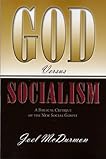 Devils and Demons and the Return of the Nephilim by John Klein
Devils and Demons and the Return of the Nephilim by John KleinMy rating: 3 of 5 stars
I bought this a couple years ago mainly due to the title. I was hoping to find some insight into the Hebrew view of Nephilim, as I was studying the issue at the time (still am actually). I THOUGHT I had read it, or at least part of it back then, but in renewing my studies recently, I pulled it out and started at page one, and realized I did not recall reading much of any of this.
My understanding is that the authors have a strong Hebrew/Jewish background, and I expected to find quite a bit of background information, and that is indeed pretty much what this book offers. Unfortunately, the title of the book is mainly the focus of only a small section of the book...like a chapter or so. Good insights in that chapter, backing up much of what I have studied elsewhere. I guess the limited coverage of the topic may be one of the reasons the book was reprinted a couple years later under a new title, Lost In Translation Vol 1: Rediscovering the Roots of Our Faith which is much more suitable.
I found a bit of the explanation of the steps of the covenant relationship to be a little at odds with my Reformed background, but intriguing still. The symbolism between the old symbols and the new fulfillments was insightful. But one of the most interesting things was the examination of the original language, and the multiple meanings contained in the words. Not only are the words meaningful, but the individual letters were symbolic and and contained additional meaning. The words have multiple depths of meaning that simply cannot be captured and translated into individual English words, so we really miss so much by not better understanding these aspects.
The only let-down was some of their eschatology views, which were NOT very Hebrew in interpretation or understanding at times. But I guess that is not so much the authors specialty. Though it makes me wonder if the second edition to this book, Lost in Translation Vol 2: The Book of Revelation Through Hebrew Eyes will be any better on the topic. I will probably pick it up anyway, since it deals with more details about interpretation and symbolism and might offer insights not commonly understood to the Greek mind.
View all my reviews









